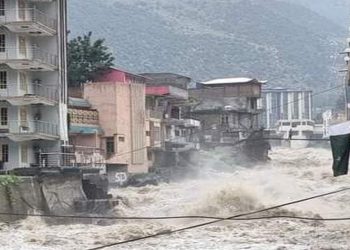Israel’s war against Hamas has deepened the international fault lines set during Russia’s war in Ukraine. Washington has spent almost two years painstakingly building support for the US-led international order against Russia. But what success the U.S. has had in building support in the Global South is coming apart in the wake of President Biden’s total support for Israeli genocide in Gaza, which has left at least 11,000 people dead, two-thirds of them women and children.
Both Russia and Israel have launched military attacks on their neighbouring territories, Ukraine and Gaza, respectively. However, there are significant differences in the causes, consequences and implications of these conflicts.
Russia’s attack on Ukraine is motivated by its geopolitical interests. Russia views Ukraine as a strategic buffer zone and a potential NATO ally that threatens its security and interests. Russia also wants to protect the Russian ethnic Ukrainians as well as Black Sea from American influence. On Thursday, February 24, 2022, Russia launched a full-scale attack on Ukraine from three sides. Russia claimed that it was acting in self-defence and protecting the rights of Russian speakers in Ukraine.
Israel’s attack on Gaza is driven by its ongoing conflict with the Palestinian people, who claim the right to self-determination and statehood in the land that Israel occupies. Israel views Gaza as a hostile territory that is controlled by Hamas, an armed group that does not recognize Israel’s right to exist and has fired rockets at Israeli towns and cities. Israel also imposes a blockade on Gaza, restricting the movement of people and goods in and out of the enclave. Israel has carried out several military operations in Gaza since 2005, aiming to stop rocket attacks and weaken Hamas. The latest assault began on Friday, August 7, 2022, after Hamas fired rockets at Israel in response to Israeli raids and arrests in the occupied West Bank and Jerusalem. Israel launched air strikes on Gaza, targeting Hamas leaders, militants, infrastructure and civilians. Israel said that it was acting in self-defense and preventing terrorism.
Israel’s attack on Gaza has caused a high toll of death, injury and devastation. According to the latest figures, at least 11,000 people dead, two-thirds of them women and children. Gaza’s infrastructure, which was already damaged by previous wars and the blockade, has been further destroyed by Israeli bombs. Israel has targeted Gaza’s largest hospital, Al-Shifa, as well as residential buildings, refugee camps and schools. Gaza’s electricity and water supply have been severely disrupted, affecting the lives of 2.3 million people. The conflict has also sparked protests and clashes in the West Bank, Jerusalem and inside Israel, where Palestinian citizens have faced discrimination and violence from Israeli forces and settlers. The international community has called for an immediate ceasefire and a political solution to the long-standing conflict, but has failed to exert any meaningful pressure on Israel.
Russia’s attack on Ukraine has profound implications for the future of Europe and the world order. It represents a blatant violation of Ukraine’s sovereignty and territorial integrity, as well as a breach of international law and norms. While, Israel’s attack on Gaza has grave implications for the human rights and dignity of the Palestinian people, as well as for the prospects of a just and lasting peace in the Middle East. It demonstrates the failure of the international community to protect the Palestinians from Israel’s occupation, oppression and aggression.
It also exposes the hypocrisy and double standards of the Western powers, which have condemned Russia’s attack on Ukraine, but have defended or ignored Israel’s attack on Gaza. It also fuels the anger and frustration of the Palestinians, who have been denied their basic rights and aspirations for decades. It also strengthens the position and popularity of Hamas, which has resisted Israel’s attacks and fired rockets at Israeli cities, while weakening the position and credibility of the Palestinian Authority, which has been unable to stop the violence or deliver any tangible results. It also increases the likelihood of further violence and extremism, as it erodes the hopes and opportunities for a peaceful and negotiated solution based on the two-state formula.

































